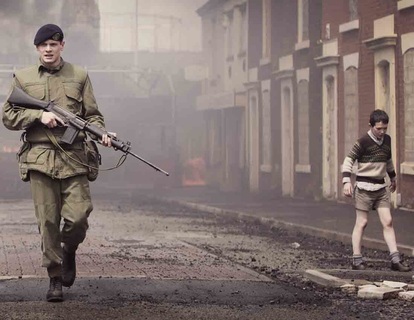
The Troubles has always been a historical period that interests me, though I feel like I have the flimsiest of grasps on it. The kind of sectarian conflict that is presently tearing apart the Middle East has only recently been quieted in the Western world, and there must be deep parallels that unite history with current events. Yann Demange's excellent thriller '71 revisits a tumultuous period of Irish history, thoroughly capturing a mood and atmosphere of upheaval and unrest while also attempting to untangle the various conflicts of interests and shifting allegiances. Over the course of one night, '71 reduces the humans on its chessboard to mere pawns in a game that swallows them whole and cares little for their suffering.
At the center of '71 is untested British army recruit Gary Hook (Jack O'Connell), an orphan with a much younger brother under his care. Hook's first deployment is to Belfast in the titular year, shortly after the Troubles have enveloped the city and the whole of Northern Ireland. His platoon's assignment is to provide cover for the Ulster police and the secret military police that are ruthlessly attempting to pacify the Irish Catholic parts of the city. During one of these excursions, a riot breaks out, and the under-equipped soldiers are overwhelmed by a surging and furious mob. In the bedlam, Hook and another soldier chase after a kid who grabs a dropped rifle, and in the confusion, are left behind by their platoon. While his comrade is shot at point-blank range by a young IRA member, Hook is able to evade capture and hides out in the city, desperate for rescue as night closes in.
Once Hook is on his own, '71 fills out the other players. The IRA is represented by small squads, divided into a young, aggressive faction and an older, calculating faction. The young are led by hot-headed James Quinn (Killian Scott), who would solve every problem with a bullet to the head. The older Boyle (David Wilmot) sees the futility of an eye-for-an-eye approach, but cannot deny the appeal of Quinn's message to teenagers like Sean (Barry Keoghan), a local youth eager to prove himself. Catholics that are just trying to live their lives get caught between the police and the IRA, both of whom can make their lives miserable, or outright end them. The Ulster Protestants have a part to play, represented by a profane gamin whose ties to the Ulster higher-ups allow him to push older combatants around. The military are in over their heads in an insurgent war, unable to discern friend from foe. Playing all sides against each other are the secret police. Led by Captain Browning (Sean Harris), their goal is not peace as much as it is a war of attrition driven by a constant stream of reprisals. They take a policy of chillingly effective realpolitik, sure that deaths can be made more useful than lives. Amidst these tangled allegiances, Hook is simply trying to get back to his baby brother.
Demange proves himself to be an excellent director throughout with an eye for action and a knack for detail that feels true to an outsider. His Belfast is covered in graffiti and uncleared rubble. The Catholic citizenry have their own built-in alarm system, as the trash can lids come out when APC's roll through town. When chases kick off, and there are several, he films the action like something from the Bourne franchise, frantic and shaky and tight through secret corridors between homes. During mob scenes, Demange puts his camera right in the face of rioters, recreating the soldiers' POV and simulating their creeping panic for the viewer. In a central set piece, Demange captures a mind-boggling unbroken shot that leaves a building right before it explodes and then reenters the now-burning and destroyed edifice. The frequent and sudden use of violence keeps the tension racheted up at all times, rarely giving the viewer a chance to breathe. In his feature debut, Demange has already made a serious name for himself.
On top of the technical aspects, Demange capably guides his actors through the gauntlet he's constructed for them. O'Connell is a rising star and avoids a misstep here. His Hook is purely reactive throughout, always adjusting to circumstances and never creating them for himself. It's an honest depiction of an average soldier in extraordinary conditions, scraping by on luck and mercy. O'Connell doesn't play it as an action hero, either, as he finds himself hiding in an outhouse in tears as the stress bleed off him. Wilmot strikes a sympathetic figure, torn between his cause and survival. Harris has to convey a willingness to kill anyone at any moment, and he ably does that as the reptilian Captain Browning. In the most affecting role, Keoghan does excellent work as the tentative IRA initiate Sean. Seen at home warmly helping his younger sister with her homework, Keoghan draws an impassive mask when the younger IRA squad comes calling. A large part of the film hinges on his decision process and Keoghan carries it well.
Beneath its thriller exterior, '71 has a beating humanist heart. The Protestant kid has plenty of slurs for Catholics, and vice versa. In a quiet moment, Hook talks about his native Derbyshire's rivalry with Nottingham, though he has no idea why it exists. These regional conflicts and the organizations that sprout up to perpetuate them are revealed to be meat grinders with no line drawn between bystander and participant, where cynicism reigns and the loudest proponents of violence are doing their enemies' work for them. For futility-of-war films, '71 is a welcome comrade. B+
 RSS Feed
RSS Feed